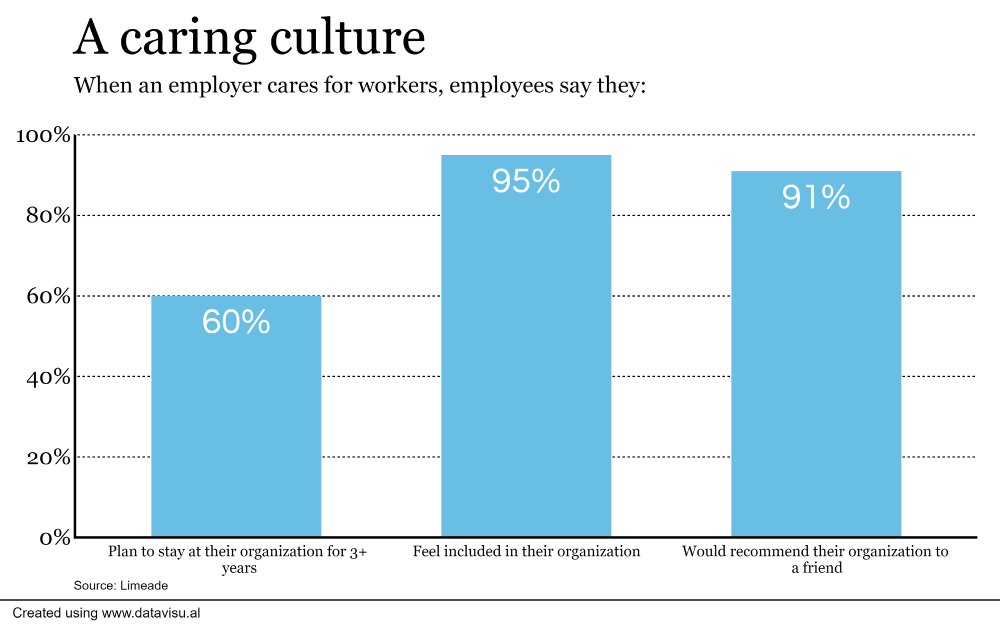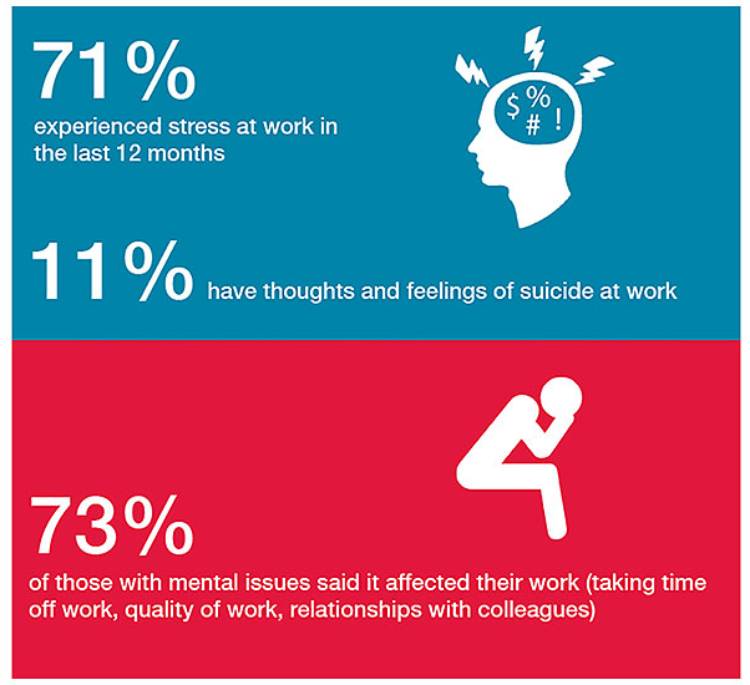As our offices become more virtual and teams scatter across locations, it has become more challenging to create a close-knit team. This article gives you practical methods to create compassion in the workplace.
When you are not in the same place, communication and team building can become a struggle. Many of us are also dealing with working from a busy home. Juggling our professional and personal lives can take a toll.
Building a culture of compassion in the workplace can help overcome isolation and creates a more productive and happy working environment for staff. In this guide, I will discuss how compassion makes for happy employees who stay with you longer and share some tips you can apply to create a culture of care in your workplace.
Importance of compassion in the workplace
More work, shorter deadlines, a virtual network where you never really log off from work, and constant competition – our workplace today comes with a lot of pressure. Many people feel stressed and overwhelmed with work.
According to self-reported data from a 2006 study by the Anxiety Disorders Association of America, stress and anxiety impacts:
- Workplace performance (56%)
- Relationship with coworkers and peers (51%)
- Quality of work (50%)
- Relationship with superiors (43%)
Work stress is why we need to ensure that an office is a place where people feel heard and understood.

Source: HR Executive
Establishing compassion in the office leads to greater employee engagement, trust, and a happier workforce. A Harvard Business Review study cited by Guardian found that empathetic companies outperform their counterparts by 20%, and the reason is simple – happier employees are more productive.

A good working environment also helps you reduce employee turnover. Compassion in the workplace leads to a caring culture that makes your employees feel included and wants to stay with the company.
You should treat compassion in the workplace with the same importance as any other trait like teamwork and effective communication. As a manager or business owner, you need to implement a top-down approach that fosters compassion through organisational practices.
It should be an essential element of your business development plan. In the next section, we will look at building a culture of care in the workplace.
Seven ways to build a culture of compassion in the workplace
Like any other soft skill in the workplace, you need to put policies in place to make compassion a part of your office culture. It is not enough to set out your ideals.
If you want your employees to feel that their concerns are being addressed, you must create official channels to provide that solution. We will look at a few ways you can be a more compassionate manager and team member and the policies you can implement to make that happen.
Actively listen to your team
Your team member or employee has come to you with a problem but are you actively listening? Hearing someone out and listening to them are two different things. Actively listening will help colleagues open up to you.
Stephen Covey’s, author of The 7 Habits of Highly Effective People, set out the steps to be an empathic listener. He states that when another person speaks, we are generally listening on one of four levels:
- Ignoring: not listening at all.
- Pretending to listen: agreeing to the points raised.
- Selective listening: hearing only the parts of the conversation you want to hear.
- Attentive listening: paying attention and focusing all of your energy on listening.
Most people never practice that fourth level of listening. If you want to be a great manager, you need to practice really listening to your staff.
During a one on one meeting, when a colleague speaks, listen to what they say. Take notes. End your meeting with a clear set of steps, and then follow up with the person regarding their concerns. I like to send an email after a meeting laying out the next steps. I like to add private notes to these emails for future reference.
If you can master the art of active listening, you will be better placed to identify problems in the workplace. Moreover, your colleagues are more likely to come forward with their issues when they feel like you care about their problems, and you will address their concerns – this is the foundation of caring company culture.
Set aside time to know your colleagues
The lunch break is not nearly enough time for the employees to get to know each other; just like you have fun team-building exercises, set time aside for your team to learn more about each other. You can host a monthly event to bring out their hidden talents or have weekly team meetings that are dedicated to just having fun.
When you take time to know people, you automatically widen your office network, breaking down barriers of rank. Openness is an essential step towards building a culture of compassion in the workplace.
Set aside time to get to know your colleagues individually. Schedule monthly meetings with each team member to discuss their concerns, and assess how they are doing.
Extend help
Compassion is not all about listening to concerns; it is also about helping out when your team member is in a tough spot. As a manager, you might recognise that a colleague is having personal problems.
Instead of expecting them to work through these problems, you can offer them a few days off work. As a team member, you could be asked to step in to meet a tight deadline or help with a difficult client.
Providing support for team members can benefit the work environment in numerous ways. For example:
- People often remember the kind acts of colleagues during a difficult time.
- Teams pull together to overcome challenges, which can result in a strong team spirit.
Always keep an eye out for people who may need your help. For example, new team members often need support. People joining a team may be hesitant to ask for help, even if they are suffering. Sometimes, building compassion in the workplace means seeing people who need help, even when they have not asked for support.
Share your expertise
Sometimes, compassion can be just about helping your co-worker gain additional skills. Know your way around excel? Host a training session for your team to share your expertise. Doing so will help you create a culture of sharing in the workplace, including skill-sharing, to lift the team.
If your teammate is in a bind, help them out by pitching in to complete their goal. Use your expertise to benefit the team and not just yourself. Sharing your expertise is particularly valuable for managers. As a manager, you should mentor your team to reach their goals and develop their professional career.
Take note of your team’s mental well being
Mental health is one of the often-overlooked aspects of the workplace, and where compassion in the workplace is most needed. One way to support mental health at work is to establish a peer network with a dedicated team member to help your employees. This person should be separated from the chain of command and will be charged with keeping the information confidential.

Source: ISHN
You could also enlist the help of an external agency or therapists to support staff.
Providing mental health support is an excellent way to show that you care about compassion in the workplace. Moreover, that support can be incredibly valuable for people experiencing workplace stress or stress in their personal lives.
Acknowledge good work
While you keep an eye on the problems your team faces, ensure that you take time to celebrate their achievements too. Appreciate their work in front of the team and give credit when due, creating an environment where a good job is not ignored.
Go on social media to give them a shout-out for a job well done or use the common channels to bring attention to their work. Use the joint team meetings to add some positivity to your team by praising your team’s good work. Also, consider providing bonuses or other incentives to reward colleagues who work hard every day at the office.
Give back to the community
Extend the virtue of compassion to people outside the workplace by giving back to society through donations, volunteer work, and raising awareness. Providing support to your local community can help cement your reputation as an employer who cares.
A 2016 study by Cone Communications estimates that about 79% of millennial workers look at corporate social responsibility when choosing a job, higher than the 58% industry average.
Doing an activity for a social cause can also be a great way to bond the team together. For example, the Oxfam trail walker event is a fun (and tiring!) way to connect with the team. The annual fundraiser, one of the world’s largest, is a 100 kilometre walk to raise awareness for Oxfam’s causes.
In Summary
A compassionate workplace helps the employees navigate the pressures of balancing their work and personal life. An open work culture that actively listens to the employees and allows them to interact with each informally supports the team. These interactions help when you need help to meet a tight deadline and turn to people and rely on their expertise to solve a problem.
As managers, you have to ensure that the employees have access to resources like a peer network or professional help when they need help. Also, remember to highlight when they do well, which helps in keeping the morale up. Remember, compassion is empathy and action combined.
About the Author
Nico is a content marketing consultant and the founder of Launch Space. He works with clients that range from Fortune 500 companies to startups providing them with insights that help generate more traffic to their site and increase sales.



